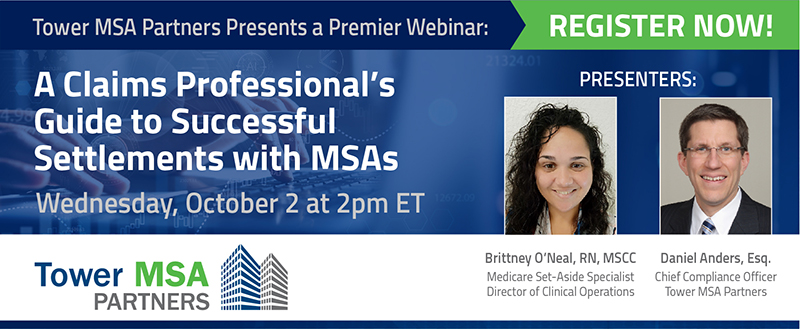Workers’ comp payers regularly measure the performance of different aspects of their programs. Understanding injury frequency rates, the average cost per claim, timeliness of claims processing, lost-time and return-to-work rates help them identify cost drivers and improve processes. Payers also evaluate the performance of external partners — provider networks, bill review, pharmacy benefit managers, third party administrators, physical therapy networks, home health and case management vendors, etc.
But do they evaluate their Medicare Set-Aside (MSA) programs and vendors – not so much.
Why not? Well, some employers, TPAs, and insurers have their Medicare Secondary Payer (MSP) services integrated into a multi-service contract. As a result, they may assume that MSAs are just part of the process – they are all the same – they take the time they take – and they cost what they cost.
Without metrics to benchmark your performance against some sort of standard, how would you know?
In the case of MSAs, until recently, payers did not have benchmarks to determine what to measure.
In 2022, for the first time, the Centers for Medicare and Medicaid Services (CMS) published some metrics that can give payers a benchmark for comparison. While CMS’ data points are limited, they offer a great place to start.
Average MSA Amount
Providing statistics from fiscal years 2020 through 2022, CMS found the average MSA recommended amount was $84,563.33 in 2020, $80,740.94 in 2021, and $81,571.75 in 2022. (“Recommended” in CMS language means CMS believes the dollar amount of the allocation will be sufficient for the lifetime medical cost of the injury. It’s equivalent to a CMS-approved amount.)
Having captured, benchmarked and analyzed our MSA submitted amounts for more than six years, Tower was excited to see how our outcomes compared to CMS’s published numbers.
One example is the average amount of an MSA. CMS’s average in 2022 was $81,571.75, while the average of Tower’s CMS-approved MSAs was $54,715. That’s nearly $27,000 less than CMS’ number, a whopping 33% less than the CMS’s average amount.
And this didn’t just happen in 2022. The average amounts of Tower’s MSAs were 32% lower in 2021 and 30% lower in 2020.
This is a credit to our powerful and persistent clinical interventions.
Approved Rx Drug Cost
CMS also broke out the cost of prescription drugs on its recommended/approved MSAs. The agency’s average prescription drug cost for 2022 was $20,776, compared to Tower’s $11,405.
Tower’s averages in this category have steadily declined since 2020 when Tower’s average Rx drug cost was $17,941, then $14,079 in 2021. If it seems like we’re boasting a little, we are. Our CEO’s strong background in pharmacy management has paid off over the years.
We have concentrated on pharmacy costs since Tower was founded in 2011. We always examine claims for unnecessary cost drivers like duplicate scripts, discontinued prescriptions, and opportunities to change from brand to generics. And Tower led the charge in identifying inappropriate opioid use on MSAs along with all the prescriptions needed to handle side-effects. Notably, in 2022, only 15% of Tower’s CMS-approved MSAs included opioids.
We don’t stop at identification, either. Our clinicians work with physicians, gain their agreement to taper injured workers off opioids and follow up to ensure changes happen.
Re-reviews
Tower also doesn’t let CMS get away with errors and misinterpretation of medical records with the MSA submission. We know our MSAs and we know the rules so that we can confidently challenge CMS when we believe it’s wrong.
While there is no formal appeals process when an MSA comes back higher than proposed, we can submit a re-review request to reduce the MSA. In 2022 Tower had a 63% success rate at obtaining a partial or full reduction from the CMS MSA counter-higher using the re-review process.
Conditional Payment Disputes and Appeals
When it comes to Medicare conditional payments, in many, many cases, the reimbursement demand is inaccurate. If the client approves, we’ll chase every dollar of savings. We’re aggressive because we have the records, fee schedules, technology, and CMS response data to fight for our clients. In 2022, our conditional payment disputes and appeals yielded an overall 92% reduction. In 70% of these cases, the demand was reduced to $0.
While CMS did not publish metrics on conditional payments, Tower believes it’s an important point to measure. There are numerous other areas that we measure and our Chief Compliance Officer Dan Anders is happy to discuss these and work with you on developing metrics for your own program. Contact him at daniel.anders@towermsa.com.











